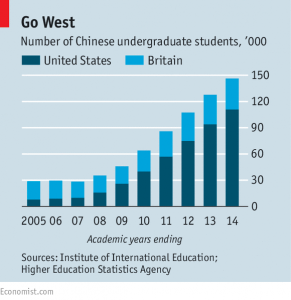Each year a larger share of China’s youth is pursuing higher education outside the nation’s borders. Although this trend started as a quest for the prestige that came with degrees from certain foreign institutions like the Ivy Leagues, Oxford or Cambridge University, it has now grown to encompass almost any institution in the developed world.
The boom in study in America is especially striking. More than 110,000 students from China were enrolled as undergraduates at American universities in the academic year of 2013-14, eleven times as many as in 2006-07. They now account for 30% of all foreign undergraduates. By comparison, the number of Chinese undergraduates in the United Kingdom less than doubled over the same period, to 35,000 (see chart). Chinese students are not only going to the United  States and Britain, but across the world as a whole. Since at least 2009 China has provided the most foreign students to France, Germany, Italy, Sweden, Finland, Japan and South Korea. At the end of 2013 nearly 1.1m Chinese were studying abroad, according to the Ministry of Education—more than three times as many as a decade earlier.
States and Britain, but across the world as a whole. Since at least 2009 China has provided the most foreign students to France, Germany, Italy, Sweden, Finland, Japan and South Korea. At the end of 2013 nearly 1.1m Chinese were studying abroad, according to the Ministry of Education—more than three times as many as a decade earlier.
The recent economic rise of China can be pointed as one of the reasons for this rise in the proportion of Chinese students going abroad and to America in particular. There are now more Chinese families that are able to bear the cost of foreign education and all the entrance exams like the SAT and ACT that most American schools require. China’s undeveloped system of higher education can also be blamed. Demand for education beyond the compulsory nine years has been constantly growing (in 2011 nearly 25m Chinese were enrolled in senior secondary school). However, the quality of instruction is poor at all but a handful of universities, where a total of just a few thousand places are available each year.
Additionally, I can personally understand the lure studying in the US has for Chinese students. While in most nations students live in their parent’s house and commute to go to class, students in america leave in college campuses. This fact allows for a very unique learning environment, in which students not only learn how to become professionals in a certain field, but also how to become independent adults.
Source: http://www.economist.com/news/china/21644222-yearning-american-higher-education-has-driven-surge-overseas-study-georgia-their
What do you get with a college education in China? The rapid expansion of higher education means many faculty aren’t well versed in what they’re teaching. In addition, large classes at new schools with only modest extracurricular programs mean little structured socialization occurs, one area in which colleges add value. Finally, new and large schools don’t serve to provide good information on their students — did they work hard and all that. So the reputation effect is weak, and employers use completion of one or another level of education as a filter to separate the wheat from the chaff, or at least who they hire from who they don’t. Of course the more students who study overseas, the poorer the ability of employers to judge whether kids went to challenging schools, actually learned English and so on.
In my Chinese class two weeks ago, we talked about the irony in which Chinese students study so hard from primary school to high school to get into a decent college yet find little value in studying at college. Studying at college in China is very relaxing, especially in comparison with all the hard work they do for the past 12 years. As more and more students graduate with a diploma (sometimes they literally buy the diploma), employers find it challenging to evaluate their qualifications. A diploma granted in the US is believed to reflect the student’s quality much more accurately.
So … a diploma is a signal that you were willing to work hard enough to get into a good college. The same thing was true in Japan. Companies in Japan also recruited during the junior year, so even if they were concerned about book learning, students don’t have a track record at the time they’re hired for anything other than intro courses — and those tend to be high-enrollment ones that use a textbook written by the prof with only short multiple choice exams, never papers or essays.